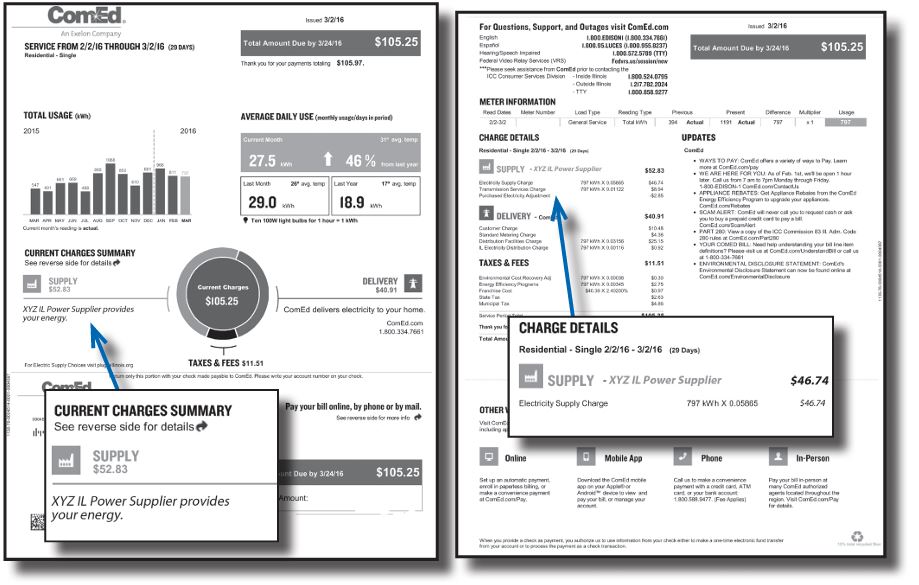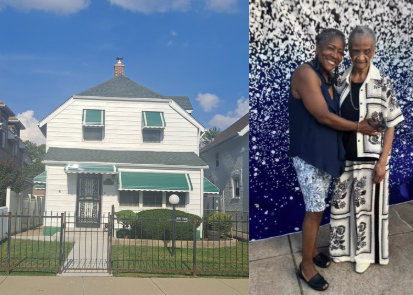Community Resources: What Are Alternative Retail Electric Suppliers?
Have you ever had someone knock on your door asking if you wanted to switch electric suppliers? If you have, then you’ve encountered an Alternative Retail Electric Supplier (ARES).
Illinois allows ARESs to solicit customers and offer to enroll them in alternative electric supply plans. ARESs often promise better electricity deals, but consumers have lost at least $800 million as a result of switching to ARES. With rising energy prices, it’s important to understand how energy supply plans work so that you can make informed decisions about your electricity costs.
So, how do ARES work, and how do you know if you’re getting a fair deal?
How does an ARES work?
Every electric bill has two main parts – delivery and supply. While your electricity delivery will always come from your local utility, your supply can come from your utility or from an ARES.
Regulated utilities make money from delivery costs and fees
For regulated investor-owned utilities, such as Ameren or ComEd, the utility is only allowed to make a profit on the delivery portion of your electric bill. Regulated investor-owned utilities are not allowed to make a profit on supply, and are mandated to supply power to customers at a rate equivalent to the cost. These utilities make money by charging cost and fees for delivering electricity through the infrastructure that they own.
Alternative Retail Electric Suppliers (ARES) make money from supply costs and fees
While a regulated utility makes money through delivery, ARESs make money through supply. While regulated utilities like Ameren or ComEd are required to supply you power at a rate equivalent to cost, an ARES can supply you power at rate that earns them a profit.
If you enroll with an ARES, your electricity will still be delivered by the regulated utility, but the supply will come from power procured by the ARES. An electricity bill with an ARES will still come through Ameren or ComEd, but there will be a note on the supply line indicating that the electricity is supplied by the ARES. Often, the supply line on your bill with an ARES will be higher than with a regulated utility.
Key Takeaways
- Regulated utilities are required to supply power at a rate equivalent to cost
- An ARES can supply power at a rate that earns them a profit
- That typically results in ARES charging higher rates for electricity supplied compared to regulated utilities
Can an ARES help you save on your electricity bill?
If you’re approached by an ARES or are already getting your power supply from one, how do you know if you’re getting a good deal?
The first thing you should do is check out Plug In Illinois, a website managed by the Illinois Commerce Commission where you can compare energy suppliers. Plug In Illinois has a price to compare section that shows you the offers made by ARES compared to the offer made by the regulated utility. Check to see if the fixed price per kWh is better than or more expensive than what the regulated utility (Ameren or ComEd) offers. Also be sure to look at the current monthly cost section to see if the ARES is more or less expensive than the regulated utility where you live.
Frequently, the fixed rate is more expensive than what the regulated utility offers. Other times, you might notice that the fixed rate is lower while the monthly cost is higher than the regulated utility. If you consider an offer from an ARES, it’s important to carefully read the terms of the contract to be sure that the fixed rate remains constant through the term of the contract. ARES will sometimes offer a low fixed rates at the beginning of a contract and then switch to a higher rate at a later time or upon renewal of the contract.

It is important to remember that ARES face the same market conditions as regulated utilities. They procure power through the same markets and are subject to the same prices. The only difference is that ARES make a profit off supplying your electricity, while regulated utilities supply electricity with no profit. For that reason, you are often better off sticking with a regulated utility instead of switching to an alternative supplier.
Key Takeaways
- Always compare prices of an ARES offer to the regulated utility in your area
- Often, the fixed price is higher for ARES than for a regulated utility
- An ARES may offer a low, competitive price that changes to higher prices later on
What to do if you’ve been contacted by an ARES
There are several resources you can check out if you’ve been contacted by an ARES. The first place to go is Plug in Illinois. This has information about current offers from ARES in both Ameren and ComEd territory. You can also visit the Citizen Utility Board (CUB) website, where you can find information about ARESs and resources to assist with high utility bills.
Be sure to never give your utility account number to an ARES representative. The practice of “slamming,” or signing people up to switch to an alternative supplier without their express consent, has been a problem in the past. The best way to prevent slamming is to simply not provide the representative of an alternative supplier with any information unless you have reviewed the details of their offer and decided to switch.
If an ARES attempts to enroll you without your consent or continues to contact you after you have instructed them to cease communications, you can file a complaint about an ARES with CUB. You can also file a complaint with the Illinois Commerce Commission.
Key Takeaways
- Plug In Illinois lets you compare current offers for all ARESs and regulated utilities
- Never give your account number or any personal information to an alternative supplier representative.
- If you have an issue with an ARES, you can file a complaint with CUB and the ICC
Learn More
Connect with Elevate by following us on Instagram and Facebook @elevatecommunityevents. Want to be featured in an upcoming story? Post photos and videos of your energy efficiency lifestyle by using the hashtag #elevatecommunityevents.
We also encourage you to get in touch with a Community Resource Coordinator to see if you’re eligible for an energy assessment through Illinois Home Weatherization Assistance Program (IHWAP). Send us a message through Instagram or Facebook or call us at (833) 204-1992.
Want to share this valuable lesson with others in the community? Share this article with family, friends, and coworkers, or reach out to Elevates community resource team for a virtual, live presentation!




